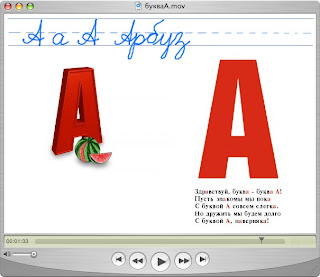Lesson 15 - Russian Cursive (Letter "")

b'
\\n
\\nToday you will learn to write Russian cursive "\\u0410". I will include more than one letter in my future lessons.
\\nThanks to one of my listeners I was able to upload a "Russian Cursive Workbook" in the DOWNLOADS section on the right.
\\n
\\nThe Cyrillic alphabet was adopted by the Slavs in about the 9th century. Although it is named after St. Cyril (Constantine), it was not invented by St. Cyril. It is based on the system of Greek capital letters. If you know the Greek alphabet, many of the letters will be familiar to you.
\\nThe Cyrillic alphabet, with some modifications, is used by many nations in Europe and Asia, including Russia, Ukraine, Belorussia, Serbia, Macedonia, Bulgaria, Uzbekistan, Kazakstan, and Mongolia, to name only a few.
\\n
\\nFew Americans write in cursive script anymore. All Russians write in cursive. You won\'t need to learn cursive to "get by" such as reading street signs or newspapers, and Russians will be able to read your notes if you print your letters. But you\'ll need to learn cursive to read Russians\' handwriting. If you want to learn "good Russian" then learn to write in cursive. If you just want to "get by" on vacation you can skip this.
\\n
\\nRussian cursive letters looks quite different from Russian printed letters. Some letters look like English cursive letters, but represent different letters. The bane of Russian cursive is the letters \\u043c \\u0442 \\u043b \\u0438 \\u0448 \\u0449 \\u0446, which look almost identical.
\\n
\\nUpper- and lower-case cursive letters look quite different. Thus Russians use three distinct alphabets: printed, upper-case cursive, and lower-case cursive.
\\n
\\n
\\nIn this example, each letter--upper and lower case--is followed by the same letter in Russian cursive. You will notice that in the block style, the only difference between the upper and lower case letters is the size. In the cursive style, certain letters distinguish between upper and lower case.
\\n
\\n(Please follow the video for this lesson. Just click on the title of the blog entry.)
\\n-----------------------------------------------------'